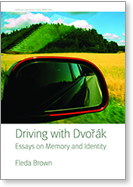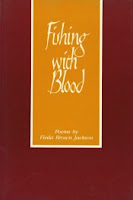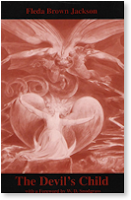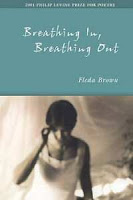 I'm pleased to welcome Fleda Brown to Michigander Monday!
I'm pleased to welcome Fleda Brown to Michigander Monday!Debbie: Fleda, please tell us a little about yourself.
Fleda: My husband and I retired to Traverse City, but we kept our old family cottage at Central Lake. What I love: swimming early in the morning when the lake is still and it’s still foggy, Paddling my little kayak down to the lily pads at the lake and counting turtles on logs, Paddling my new stand-up paddleboard. I’ll be 68 this summer. I write almost every morning—in the summers, I swim first.
 I grew up mostly in Arkansas—my father taught for a number of years at the University of Arkansas. There were four children in my family, including a severely brain-damaged brother who had grand mal seizures all his life. I got married the first time when I was 17, not yet out of high school. I wasn’t pregnant, just wanted to leave home. My first husband and I had two children, Kelly and Scott. Kelly and her husband now have four children. They live in London, shortly to move to D.C. Their oldest (my oldest grandchild) is a freshman at Brown University this year. Scott and his wife and two children live in New Jersey. My present husband Jerry has two daughters who each have two children, so we have ten grandchildren between us. They all get to our lake in the summers, some of them every summer.
I grew up mostly in Arkansas—my father taught for a number of years at the University of Arkansas. There were four children in my family, including a severely brain-damaged brother who had grand mal seizures all his life. I got married the first time when I was 17, not yet out of high school. I wasn’t pregnant, just wanted to leave home. My first husband and I had two children, Kelly and Scott. Kelly and her husband now have four children. They live in London, shortly to move to D.C. Their oldest (my oldest grandchild) is a freshman at Brown University this year. Scott and his wife and two children live in New Jersey. My present husband Jerry has two daughters who each have two children, so we have ten grandchildren between us. They all get to our lake in the summers, some of them every summer.  Back to early years: I got an M.A. and Ph.D. in American Literature from the University of Arkansas, while getting divorced and remarried, moved to Delaware, was hired on a tenure track line and spent my entire academic career teaching there. During those almost-thirty years, I got divorced again and remarried to the wonderful man I’ve now been married to for over 20 years. In those years, I got to know Delaware pretty well—it’s a small state, and I was poet laureate from 2001-2007 and traveled all over it. I liked many things about Delaware—its downstate beaches, its bird sanctuaries and flyways, its rich history, and our good friends—but I never felt the attachment to the place that I felt for Michigan. My grandparents bought our cottage at Central Lake in 1918, and I spent the summers there all my growing-up years. This state is my real home.
Back to early years: I got an M.A. and Ph.D. in American Literature from the University of Arkansas, while getting divorced and remarried, moved to Delaware, was hired on a tenure track line and spent my entire academic career teaching there. During those almost-thirty years, I got divorced again and remarried to the wonderful man I’ve now been married to for over 20 years. In those years, I got to know Delaware pretty well—it’s a small state, and I was poet laureate from 2001-2007 and traveled all over it. I liked many things about Delaware—its downstate beaches, its bird sanctuaries and flyways, its rich history, and our good friends—but I never felt the attachment to the place that I felt for Michigan. My grandparents bought our cottage at Central Lake in 1918, and I spent the summers there all my growing-up years. This state is my real home.I say all this so much better, with so much love and detail, in my memoir. I feel as if this little paragraph is like a fish skeleton lying on the beach. Not much resemblance to a live fish.
Debbie: And, of course, we want to know all about your books.
 Fleda: As I was finishing my dissertation (not on poetry, by the way), I started sending poems out and had some success, so I started sending more. My first book, Fishing With Blood, came out from Purdue University Press when I was 44. So take heart, young poets. Some of us have a longer incubation period. That book won the Great Lakes Colleges Association New Writers Award, which consists of a reading tour of the schools that belong to the Great Lakes Colleges Association. That was wonderful and scary, since I had done very little public reading before. And Jane Hamilton had won in fiction and toured before me. Everywhere I went, they told me how wonderful she’d been. Akkk! I met some people—like Jack Ridl and Conrad Hillberry—who became permanent friends. Michigan was tugging at my sleeve even then.
Fleda: As I was finishing my dissertation (not on poetry, by the way), I started sending poems out and had some success, so I started sending more. My first book, Fishing With Blood, came out from Purdue University Press when I was 44. So take heart, young poets. Some of us have a longer incubation period. That book won the Great Lakes Colleges Association New Writers Award, which consists of a reading tour of the schools that belong to the Great Lakes Colleges Association. That was wonderful and scary, since I had done very little public reading before. And Jane Hamilton had won in fiction and toured before me. Everywhere I went, they told me how wonderful she’d been. Akkk! I met some people—like Jack Ridl and Conrad Hillberry—who became permanent friends. Michigan was tugging at my sleeve even then.I was terrified that the first book was some sort of miraculous fluke, but Gerald Stern chose the second one, Do Not Peel the Birches (poems mostly about Michigan), also for Purdue. I think their poetry series is now defunct.
 The third and fourth books were from Carnegie Mellon and were written almost simultaneously. This is weird, because they’re exact opposites. Maybe that’s the point. The Devil’s Child is a true story of a woman who was raised in a satanic cult and developed multiple personalities because of the terrible mental and sexual abuse she suffered. This book was the hardest I’ve ever written and may be the one I’m proudest of. At the same time I was working on The Women Who Loved Elvis All Their Lives, which was a pure joy to write—although the poems don’t flatter Elvis particularly. They show him for what he was (from biographies), but at the same time, I hope, are full of love and admiration for a man whose whole existence was his music. I went to Graceland (a “research trip,” of course) and wrote a poem series on being there.
The third and fourth books were from Carnegie Mellon and were written almost simultaneously. This is weird, because they’re exact opposites. Maybe that’s the point. The Devil’s Child is a true story of a woman who was raised in a satanic cult and developed multiple personalities because of the terrible mental and sexual abuse she suffered. This book was the hardest I’ve ever written and may be the one I’m proudest of. At the same time I was working on The Women Who Loved Elvis All Their Lives, which was a pure joy to write—although the poems don’t flatter Elvis particularly. They show him for what he was (from biographies), but at the same time, I hope, are full of love and admiration for a man whose whole existence was his music. I went to Graceland (a “research trip,” of course) and wrote a poem series on being there.Breathing in, Breathing Out was chosen by Phillip Levine as the first winner of the Levine Prize and published by Anhinga Press in 2001. The poems are ones that didn’t fit any of the above two categories, ones I’d been working on for years off and on. It includes a longer poem, “Einstein on Mercer Street” that was the libretto for a piece for orchestra and voice written by my nephew Kevin Puts, who just won the Pulitzer Prize in music this year! Yea, Kevin! Kevin has set a number of my poems to music and has one in the works at the moment.
Reunion won the 2007 Felix Pollack Prize from Wisconsin. I had thought this book would center on my high school reunion. I left for Arkansas armed with notebook and pen, but not many poems came out of that trip. The book ended up being more about Michigan, and a little about Delaware. Michigan was beginning to get a stronger grip on me and certainly gave me more poems.
So in 2010, I put together a benefit book for The Watershed Center, a non-profit organization that monitors water quality in the entire watershed area of Grand Traverse Bay. ALL of the price of Loon Cry goes to support the Watershed Center. The book includes Michigan poems from all my other books.
 I’d been writing and publishing a few essays all along, and these turned into my memoir-in-essays, Driving With Dvorak, published by University of Nebraska Press in 2010. I hadn’t intended to write this book, but the essays piled up and I saw that together, they made the story of my life. I’d say it’s the story of my life and Michigan, mainly. You can see how our cottage and our lake have been the wellspring of my writing. I wrote an essay about living with my poor retarded brother that remains for me my definitive story of how it was. And I began to understand my brilliant and strange father, in the course of the essays. So it was a very satisfying book to write.
I’d been writing and publishing a few essays all along, and these turned into my memoir-in-essays, Driving With Dvorak, published by University of Nebraska Press in 2010. I hadn’t intended to write this book, but the essays piled up and I saw that together, they made the story of my life. I’d say it’s the story of my life and Michigan, mainly. You can see how our cottage and our lake have been the wellspring of my writing. I wrote an essay about living with my poor retarded brother that remains for me my definitive story of how it was. And I began to understand my brilliant and strange father, in the course of the essays. So it was a very satisfying book to write. Debbie: Other books or projects on the horizon?
Fleda: Oh yes, retirement is a wonderful thing. I have a book of poems, No Need of Sympathy, coming out from BOA Editions in 2013. And I’ve written a book of essays based on interviews with homeless people. I am pretty excited about this book, but it’s under consideration by a press at the moment, so I don’t feel like saying much right now. I’m holding my breath and hoping for the best. But all of us who write get used to rejection and know how to pick ourselves up and try again.
And then for the past year I’ve been working on a book of essays with my dear friend Sydney Lea, who’s currently the poet laureate of Vermont. Syd and I are picking topics—books, children, food, sex, clothes, etc.—and each writing an essay on that subject from our old geezer’s (can a woman be a geezer?) point of view. The essays are sort of “how it once was, for us, compared to how things are now.” We’re having great fun with this and will both be sad when it’s done. We haven’t started looking for a publisher yet.
Debbie: Upcoming appearances?
 Fleda: I’ll be one of the TEDx speakers at Millikan Auditorium of the Dennos Museum Center in Traverse City on May 16th. My talk will be “How Poetry and Meditation Can Save the World.” How bold is that? Then I’ll be in Charlevoix for the Zonta Women’s Club on May 19th. On June 21, I’ll be on a panel called “Up in Michigan” for the International Hemingway Society’s Convention in Petosky. On June 22nd, I’m reading at Dog Ears Books in Northport. On June 27th I’ll be at McLean & Eakin’s Bookstore in Petoskey. I fill in details on my website as soon as I have them. After that, we have family at the lake until I leave in August to teach in the Rainier Writing Workshop MFA program in Tacoma, WA. I’m there for ten days.
Fleda: I’ll be one of the TEDx speakers at Millikan Auditorium of the Dennos Museum Center in Traverse City on May 16th. My talk will be “How Poetry and Meditation Can Save the World.” How bold is that? Then I’ll be in Charlevoix for the Zonta Women’s Club on May 19th. On June 21, I’ll be on a panel called “Up in Michigan” for the International Hemingway Society’s Convention in Petosky. On June 22nd, I’m reading at Dog Ears Books in Northport. On June 27th I’ll be at McLean & Eakin’s Bookstore in Petoskey. I fill in details on my website as soon as I have them. After that, we have family at the lake until I leave in August to teach in the Rainier Writing Workshop MFA program in Tacoma, WA. I’m there for ten days. Debbie: Do you have a favorite Michigan bookstore? And/or a favorite Michigan library?
Fleda: My favorite bookstore is Brilliant Books in Traverse City. Peter Makin, the owner, makes writers feel welcome and celebrated. He values poetry when most bookstores hide it in the dusty back shelves. He’s even hired a poetry curator, Holly Wren Spaulding, a poet who teaches at NMC. And he throws a great party for book launches and other celebrations.
My favorite library is the Traverse Area District Library. It’s an amazing and beautiful library overlooking Boardman Lake, with many different offerings, such a good collection. And my husband is the President of the Board of Trustees (!).
Debbie: How about a favorite place in Michigan?
 Fleda: I dearly love our cottage at Central Lake, but the truth is, Traverse City is my favorite place. I adore living here. It’s kind of magical. It has everything a big city would have without being a big city. Go away, people. Don’t move here.
Fleda: I dearly love our cottage at Central Lake, but the truth is, Traverse City is my favorite place. I adore living here. It’s kind of magical. It has everything a big city would have without being a big city. Go away, people. Don’t move here.Debbie: Do you have a Michigan event or happening that you love to attend?
Fleda: I think it’s great fun to sit on the end of our dock at the lake and watch the July 4th fireworks from the high school football field across the lake. We counted 52 boats in front of our cottage a couple of years ago, all there to watch the fireworks. You thought I’d say the TC Film Festival, didn’t you? Or the Cherry Festival? We’re at the lake with our families during that time and don’t get in for those.
Debbie: A few fun Michigan people we should all know about?
Fleda: You probably already know the ones I might name, and I fear leaving someone out. When I moved to Traverse City, I was asked immediately to be on the board of a group called “Michigan Writers.” I found out quickly what a lively and supportive climate this is for writers. I will only single out Aaron Stander, whose selfless devotion to the writing world is evident in his Interlochen Public Radio show, “Michigan Writers on the Air.” The show is one of the best I’ve ever heard. As well as being a popular mystery writer himself, Aaron’s as good an interviewer as Terry Gross. (disclaimer: I do a 10 minute review of poetry books on the show). As for other writers, I was at a packed-house poetry reading at Brilliant Books recently, looked around me at the writers and passionate readers and thought, this is a Golden Age.
Debbie: Something you'd like a non-Michigander to know about Michigan?
Fleda: We invite our east coast friends to visit and their mouths fall open in wonder. They have no idea there’s so much beauty here. I like the fact that it’s kind of a secret.
 Debbie: Finally, last question. Some folks in Michigan refer to themselves as Michiganders; others Michiganians. For our ongoing vote tally: are you a "Michigander" or a "Michiganian"?
Debbie: Finally, last question. Some folks in Michigan refer to themselves as Michiganders; others Michiganians. For our ongoing vote tally: are you a "Michigander" or a "Michiganian"?Fleda: Michigander. “Gander” makes me think of geese, which makes me think of ducks. I like ducks. We have two in our front yard at the moment, and we’re in the middle of town.
Debbie: Michigander it is! Fleda, thank you so much for being here today for Michigander Monday!
To learn more about Fleda, stop by her web site and blog. And be sure to visit her books page for more about her books, and her events page to find out when she'll be in your area.